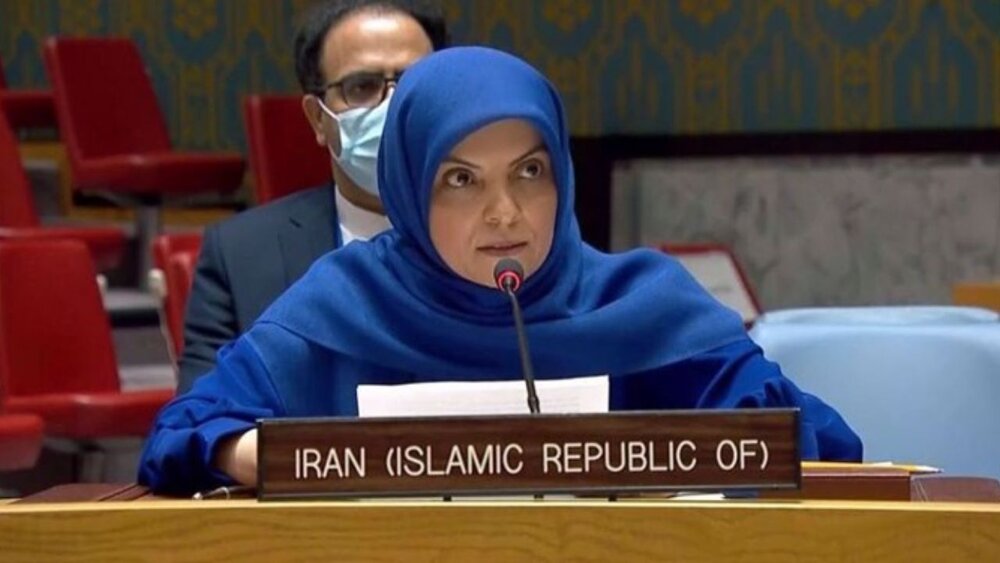Iran condemns irresponsibility toward Syria

TEHRAN — Zahra Ershadi, Iran’s Deputy Permanent Representative to the United Nations, on Tuesday condemned indifference of the UN member states toward recent aggressions against Syria.
In her speech, she called on all member states to “honor their promises” to UN Security Council Resolution 2585 regarding Syria.
The following is Ershadi’s statement in the UN Security Council meeting:
“In the Name of God, the Compassionate, the Merciful.
Mr. President,
We recall resolution 2585 through which the Security Council has called upon all Member States “to respond with practical steps to address the urgent needs of the Syrian people”.
It is essential that the Council has also recognized “that humanitarian activities are broader than solely addressing the immediate needs of the affected population and should include support to essential services through water, sanitation, health, education, and shelter early recovery projects”.
Given that the imposition of unlawful unilateral sanctions against Syria by certain countries is one of the major causes of the current humanitarian situation in that country, the Council, by using the term “practical steps”, is literally calling, though implicitly, for the removal of such sanctions, at least in areas related to “early recovery projects”.
Yet, this call must not be misconstrued as if sanctions imposed on other sectors are acceptable or assisting Syria in other areas particularly reconstruction efforts are less important.
As resolution 2585 is the result of a compromise, including by main countries imposing such sanctions, we urge them to honor their promises, take their obligations under that resolution seriously, and remove, immediately and fully, all unlawful sanctions against Syria.
In a situation that has been described by the Council as a “complex humanitarian emergency”, removing unilateral sanctions are essential also due to the fact that sanctions seriously undermine the efficiency of humanitarian operations in Syria conducted by the United Nations and international non-governmental organizations.
As most of the humanitarian operations are carried out from inside Syria, in line with the call by resolution 2585, cross-line humanitarian assistance must be improved. This can be done including through a substantial increase in allocated assistance and ensuring that they are commensurate with the size of population living in areas covered by such operations.
Likewise, we positively note requesting the Secretary-General to provide a report containing detailed information on the cross-border operations, including the distribution mechanism, operating partners, and the volume and nature of items delivered.
This must lead to addressing one of the missing points in cross-border humanitarian assistance, namely the lack of transparency.
In any case, cross-border mechanism must be used in full accordance with the United Nations guiding principles of humanitarian emergency assistance and it must be guaranteed that this mechanism is not used, directly or indirectly, for lending any support to terrorist groups inside Syria.
The full, effective and good-faith implementation of resolution 2585, beyond addressing the urgent humanitarian needs of the Syrian people, can have positive implications on other areas, leading to depoliticization of humanitarian assistance and creating certain level of trust and confidence, which is required for further cooperation towards peaceful settlement of this crisis.
In this context, we reiterate our principled position that the Syrian crisis must be settled peacefully and in accordance with principles of international law, particularly respect for the sovereignty and territorial integrity of States, non-intervention and non-interference in their internal or external affairs and peaceful settlement of international disputes.
To create conducive grounds for ending the conflict in Syria, all uninvited foreign forces must leave that country without any precondition and delay, and terrorist groups must be confronted.
Equally important, the Council must compel the Israeli regime to put an immediate end to its aggressions against sovereignty and territorial integrity of Syria. Such adventuristic practices constitute flagrant violations of international law, threatening regional and international peace and security.
Along with other members of the Astana format, we support the Constitutional Committee’s work which must continue according to its rules of procedure and without foreign interference or externally imposed timelines. We hope the Committee’s next meeting will commence soon.
Committed to the restoration of the unity and territorial integrity of Syria, we will continue our efforts in assisting the people and Government of Syria to overcome the enormous challenges they face.
I thank you, Mr. President.”
Lebanon complained to the United Nations after Israeli regime sent jets violating its airspace to carry out an airstrike on targets in Syria on August 19.
Zeina Akar, Beirut’s Defense Minister said Israeli planes “blatantly violated Lebanon’s airspace at low altitude, causing a state of panic among citizens,” Reuters reported.
The complaint came hours after Damascus residents reported hearing loud explosions from airstrikes targeting sites in the Syrian capital and the Homs area north of the capital.
Syrian state television said its air defense systems managed to knock down most of Israeli missiles that had been fired from near Beirut.
There were no official reports of casualties as the Syrian air defense units had managed to down 22 of the 24 missiles launched by six Israeli warplanes.
The Syrian Foreign Ministry later renewed its call on the United Nations and the Security Council to assume responsibilities based on the UN Charter and act firmly to prevent the recurrence of the Israeli regime’s attacks on Syria’s territory.
The attacks started to grow significantly in scale and frequency after 2011, when Syria found itself in the grip of rampant foreign-backed militancy and terrorism.
Tel Aviv claims that its attacks target alleged supplies that are headed for the Lebanese resistance movement of Hezbollah. On countless occasions, though, the strikes have targeted the reinforcement belonging to Syria’s military and its allies.
SA/PA
Leave a Comment